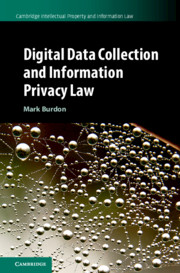Book contents
- Digital Data Collection and Information Privacy Law
- Cambridge Intellectual Property and Information Law
- Digital Data Collection and Information Privacy Law
- Copyright page
- Dedication
- Contents
- Figure and Tables
- Acknowledgements
- 1 Introduction
- Part I The Collected World
- 2 The Smart World Is the Collected World
- 3 The Smart Home: A Collected Target
- 4 Commercialising the Collected
- Part II Information Privacy Law’s Concepts and Application
- Part III Information Privacy Law for a Collected Future
- Bibliography
- Index
- Cambridge Intellectual Property and Information Law
4 - Commercialising the Collected
from Part I - The Collected World
Published online by Cambridge University Press: 04 April 2020
- Digital Data Collection and Information Privacy Law
- Cambridge Intellectual Property and Information Law
- Digital Data Collection and Information Privacy Law
- Copyright page
- Dedication
- Contents
- Figure and Tables
- Acknowledgements
- 1 Introduction
- Part I The Collected World
- 2 The Smart World Is the Collected World
- 3 The Smart Home: A Collected Target
- 4 Commercialising the Collected
- Part II Information Privacy Law’s Concepts and Application
- Part III Information Privacy Law for a Collected Future
- Bibliography
- Index
- Cambridge Intellectual Property and Information Law
Summary
Chapter 4 examines commercial imperatives for collections of sensor data by exploring the rapid development of smart home insurance business models. A brief history of smart home insurance is provided to situate three conceptualised models of smart home data exchange partnership involving insurers and smart home device or system providers. The models are entitled the Partnered Data Acquisition, Partnered Intermediary and Platform Entity models. Each model involves a partnership arrangement between an established insurer and a smart home device or system provider. However, while each model seeks to capitalise value from smart home sensor data, each model does so in different ways, across three spectra, namely, collection of data, connection to mutually beneficial services and condition setting. An analysis of relevant privacy policies is undertaken to highlight each model’s operational data structure, the sensor data collected and its foundational characteristics. In turn, this analysis highlights the commercial uses of smart home sensor data involving new logics, business relationships and intended service outcomes.
Keywords
- Type
- Chapter
- Information
- Digital Data Collection and Information Privacy Law , pp. 67 - 98Publisher: Cambridge University PressPrint publication year: 2020



